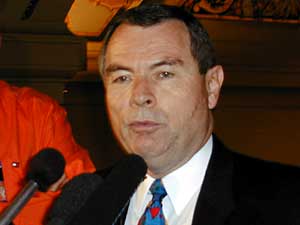Audio
Photos
Your Voice
| |||||||||||||||||||||||||||||||||||||||||||||||
House passes 'tough but fair' human services budget
May 2, 2003
The Minnesota House has passed on a 74-59 vote a $7.1 billion budget bill that funds health and human services programs. The bill cuts the state's subsidized health insurance, child care and programs for the elderly. House Republicans say they're providing a 9 percent increase to the services. But the bill makes cuts because higher health care costs and increased demand has driven the state's projected costs to over 20 percent. Opponents say the bill unfairly targets the lower income and the poor.
St. Paul, Minn. — The House wasted little time moving from an 11-hour debate on state government finances to the health and human services bill. The debate started close to midnight, leaving several DFL House members to question Republican tactics. House Minority Leader Matt Entenza of St. Paul says House Republicans didn't want the public and a thin media corps to notice the bill's impact on social service programs.
"Apparently in the middle of the night, this majority wants to cuts nursing homes while grandma sleeps. They want 68,000 people to lose their access health care while many hard working people are sleeping," Entenza said.
Rep. Fran Bradley, R-Rochester, says his bill makes cuts, but would continue to make Minnesota one of the most generous states in regard to social service programs.
"The results were tough but fair," says Bradley. "Members, we've done the best we could."
The bill would cut the state's health care program for single adults. It also reduces eligibility and raises payments for other health insurance programs.
The bill also makes changes to the state's welfare system, by requiring welfare recipients to find a job before they receive any cash assistance. Bradley says the state's $4.2 billion deficit forced him to think differently about the state's social service programs.
"I'm sort of tired of my neighbors saying, 'Why in the world is this person getting free health care? Why can this person get away with this kind of welfare, being on welfare?'" Bradley says.
Critics say the bill will be onerous for lower income Minnesotans. They say cuts to nutrition services and subsidized child care may increase the state's welfare rolls. DFL Rep. Nora Slawik says the House bill cuts $75 million from the state's subsidized day care program. She says it will only grow the state's child care waiting lists.
"I've heard Representative Bradley refer to it as a Cadillac system. This isn't a Cadillac system, it's a Chevy system. Representative Bradley wants to make it a Pinto system and rear-end it and have it blow up," Slawik says.
Others say the bill will add to the financial struggles for local hospitals. Rep. Tom Huntley, DFL-Duluth, says hospitals will be forced to increase their charity care. He says hospitals will need to treat 68,000 Minnesotans who will lose their subsidized health insurance through 2007.
"This, folks, is a shell game. We're making the state budget look good but we're just transferring costs to someone else. In this case we're transferring those costs to hospitals, and what are they going to do? They're either going to close their doors or raise their rates onto everybody else," Huntley says.
But Rep. Tim Wilkin, R-Eagan, says he doesn't think the state projections on the uninsured is accurate. He says the number should be significantly lower. Wilkin also reminded his colleagues that the state can't keep paying for the current social programs at current funding levels.
"If we let these programs go and continue to grow and grow, you are not going to fund the other programs that are near and dear to your heart. So if you love K-12 education, you're going to want to vote for this bill. If you love higher education you're going to want to vote for this bill," says Wilkin.
House members also refrained from offering a number of abortion-related amendments. The House did attach an amendment that would forbid the state from covering the abortion pill RU-486 in a drug rebate program.
The House bill is much different from the DFL version in the Senate. The Senate plan would continue funding many programs at current levels, but would raise the cigarette tax to do it. Republican House Speaker Steve Sviggum says tax increases are off the table. He says the two sides will likely have differences on spending and policy.
"We feel that the session ought be more than just about the reconciling about tax and spend. We feel strongly that government needs to change and govenment needs to reform. Change is going to happen," says Sviggum.
The Senate will take up its health and human services bill Friday or Saturday.
|
News Headlines
|
Related Subjects
|


